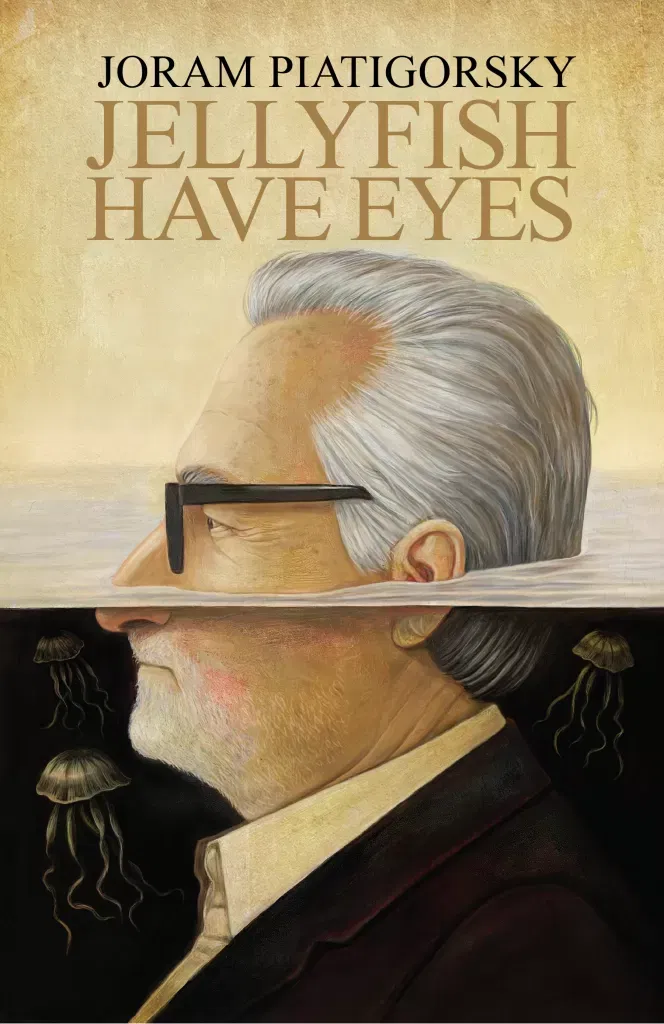He made a deathbed promise to research cancer cures. When a marvelous natural wonder calls, will ignoring his conscience lead to ruin?
2048. Ricardo Sztein craves knowledge. Cocooned in grief after the loss of his wife of four decades, the nationally recognized scientist is roused from his stupor by an incredible discovery. Fascinated by evolution and counterintuitive research, he ignores his promise to his dying spouse to find a cure for cancer in favor of learning more about jellyfish eyes.
Tormented by insecurity and doubts, Ricardo’s increasing jealousy of his closest friend pushes him further past the point of no return. So when he proudly publishes his findings to the world, he’s stunned to be facing a criminal trial.
Will his endless thirst for understanding leave his career in ruins?
Jellyfish Have Eyes is the thought-provoking first book in the Jellyfish Have Eyes science fiction series. If you like inspirational characters, page-turning conflict, and serious discussions of important issues, then you’ll love Joram Piatigorsky’s provocative tale.

Excerpt from Jellyfish Have Eyes
WHAT AMAZON READERS ARE SAYING
WHAT READERS ARE SAYING
- Kirkus Reviews: An intelligent, wistful rumination …

Piatigorsky (The Speed of Dark, 2018, etc.) offers a speculative novel about a researcher undertaking a pure-knowledge scientific study in an era of hostility to free inquiry.
Financial collapse in the near future has left the United States with a huge unemployment rate, new diseases appearing and old scourges returning, more conservatives in Congress, and a rabble-rousing Washington, D.C., reporter slamming taxpayer spending on any research that doesn’t promise immediate, practical payoff. In the 2040s, researcher Ricardo Sztein is an aged, respected fixture at the Vision Science Center who is shaken after his wife’s cancer death. He embraces his other great love—science experimentation just for the sake of knowledge, not a dictated agenda or financial return. His curiosity about how jellyfish see with multiple eyes (“rhopalia”) of unexpected complexity sends him to the swamps of Puerto Rico, supported by like-minded colleagues and a loan of NASA computer tech. Clues uncovered in his field lab hint at new revelations about animal perception and evolutionary biology. But when his rambles become publicly known, grandstanding politicians and media condemn him, cuing a public tribunal that’s reminiscent of that in the film Inherit the Wind. Piatigorsky is a scientist and essayist, so he knows of what he speaks regarding the cloistered realm of modern inquiry and exploration, which includes people jockeying for grants with ambition masked by professional etiquette. He also expresses scientists’ angst that average citizens appreciate nothing about basic research and could pull the plug on it at any moment. The future that the author evokes in this high-minded, speculative drama is thinly sketched, but what readers do glean about it is unpleasant, indeed. The jellyfish material, meanwhile, seems fanciful, but it’s firmly based in fact; the author includes photographic illustrations here that shore up the science. Still, it’s an intelligent, wistful rumination on the value of scientific pursuit, the joy of discovery, and the loneliness of a maverick thinker. A sensitive drama about an aged scientist in an anti-intellectual era.
–Kirkus Reviews
- “Original and provocative”
"In this original and provocative combination of science and fiction, Joram Piatigorsky brings to life evidence of Dr. Johnson’s observation that Truth can be made more accessible when draped in the robes of fiction."
–Warren Poland, MD, Psychoanalyst, author, Melting the Darkness
- “Fascinating and delightful”
“This highly original story of jellyfish is fascinating and delightful. We travel to a warm mangrove swamp near Puerto Rico with Dr. Ricardo Sztein, who discovers that these fish store evolutionary memories. Troubles abound when his studies are revealed, but the adventures of this quirky, endearing scientist are memorable.”
– Ann L. McLaughlin, author, Amy & George
- “Brilliant first novel”
"In the author's brilliant first novel, we travel into a tropical lagoon with Dr. Ricardo Sztein, a maverick scientist who is mesmerized by jellyfish. This fast-paced adventure is partly about Dr. Sztein's unusual and fascinating discoveries as he studies his beloved jellyfish. It also raises compelling questions about whether originality and creativity in research are valued or demonized by our government and academia."
– Stanton Samenow, Ph.D., Clinical Psychologist, author, Inside the Criminal Mind
- “Interesting on many levels!”
A wonderful book! The book's main character is a scientist, an expert on diseases affecting eyes, who becomes fascinated by jellyfish. (They do have eyes…very complex eyes!) The book is interesting on many levels: the value of basic scientific research; the pressure to link research to medical advances in order to obtain funding, and the politics of funding scientific research. I loved the descriptions linking scientific discovery and creativity.
The author, Joran Piatigorsky, is an internationally respected, award-winning scientist whose specialty is the molecular biology of the eye. This is his first novel. I look forward to reading more of his work.
–Deborah Hartman
- “Ricardo Sztein is an unforgettable character”
"This novel draws you into its web of complex circumstances by degrees, unfolding like a kind of scientific experiment; it unravels the entire research and scientific community—challenges the tenets of evolution, knowledge, being and believing. The unity of knowledge, knowledge itself is turned upside down. Ricardo Sztein is an unforgettable character, and this story is definitely a winner."
–Robert Bausch, author, A Hole in the Earth, and Far as the Eye Can See
- “Rich dystopian novel”
"In this rich dystopian novel Ricardo Sztein risks all to follow his intellectual curiosity in defiance of the extreme utilitarianism of his society. The spiritual cousin of Dickens’ “Hard Times”, with a nod to Big Brother, “Jellyfish” projects our current pragmatism into a frightening but possible future. A wonderful book for those who love creativity, science and the great gifts of serendipity."
–Barbara Esstman, author, The Other Anna and Night Ride Home
- “Gives a chilling warning that is sure to stimulate debate”
“The time is the near future when an economically stressed government threatens academic freedom of basic scientists. In ‘Jellyfish Have Eyes,’ an award-winning scientist pays a heavy price for his breakthrough discoveries that jellyfish interact and visualize evolution. Piatigorsky’s imaginative account that Dr. Ricardo Sztein’s path from discovery to condemnation gives a chilling warning that is sure to stimulate debate on the role of government in dictating the direction of scientific research.”
–Joseph Horwitz, Ph.D., Distinguished Professor, UCLA School of Medicine
